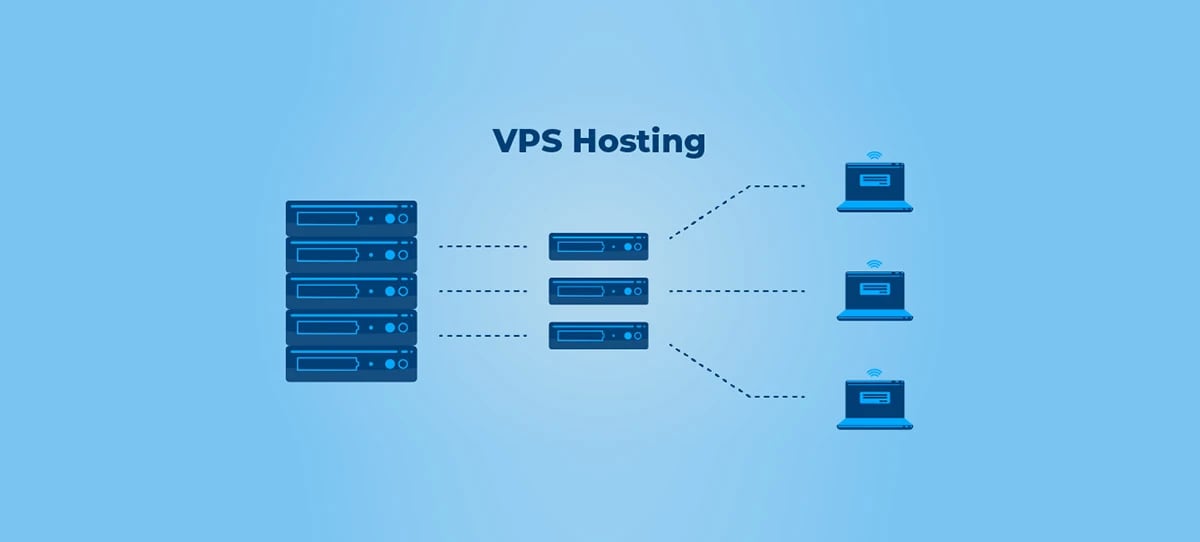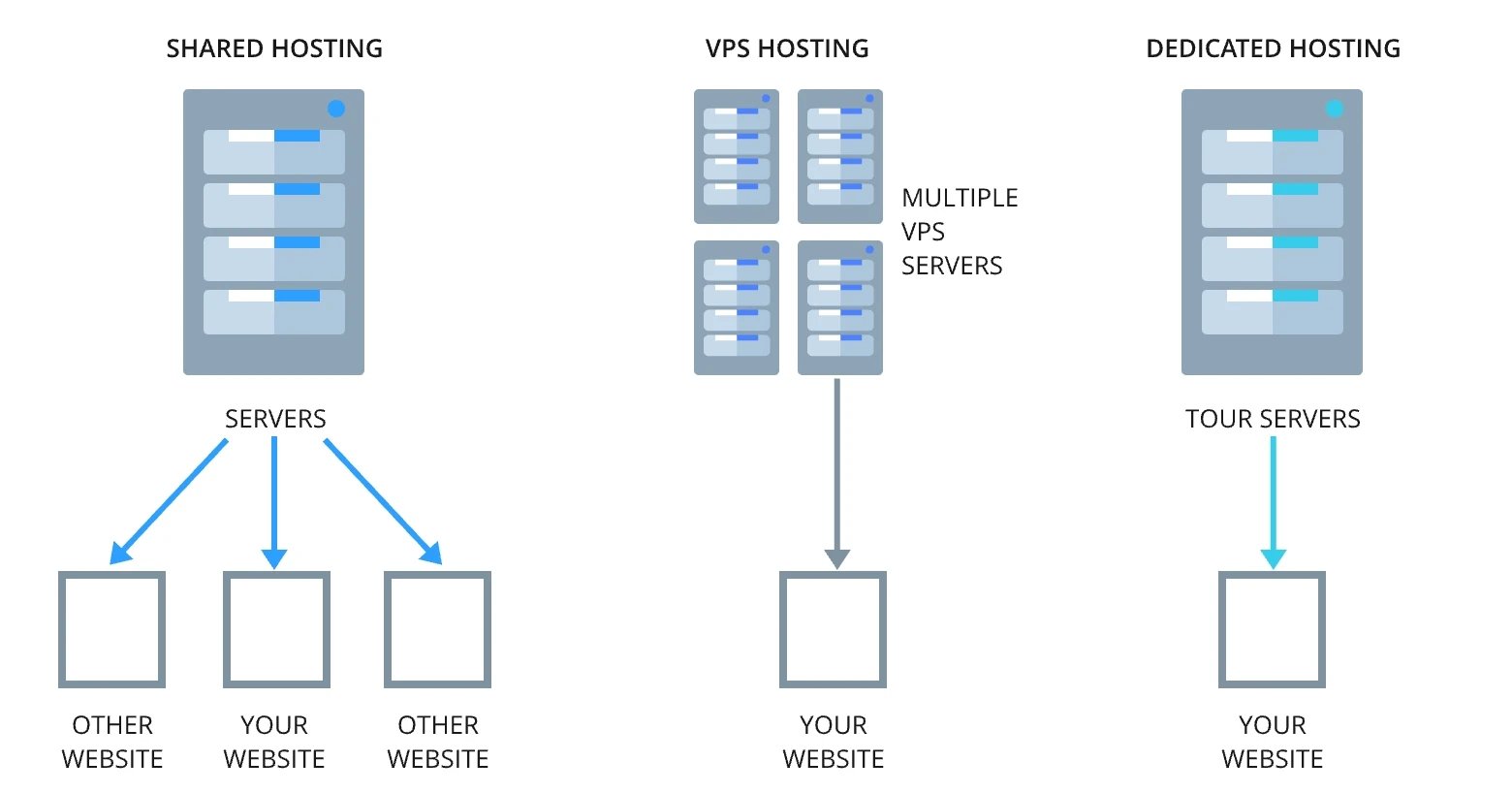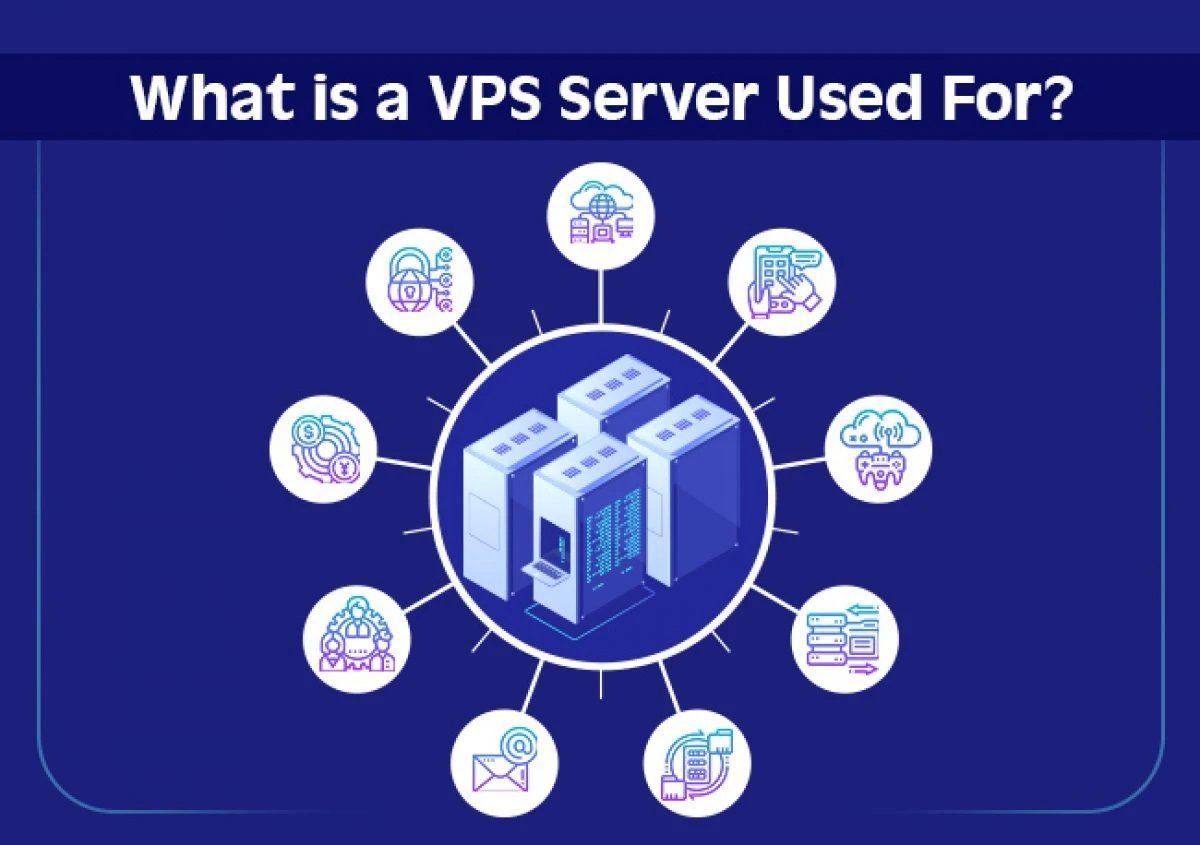What is VPS hosting? Virtual Private Server (VPS) hosting is a type of web hosting that offers a middle ground between shared hosting and dedicated servers. But what is VPS, and why is it so popular? Essentially, VPS uses virtualization technology to partition a physical server into multiple private servers, each with its own resources, operating system, and control. This answers the question, “what is a VPS” by providing an isolated environment for users to host their websites or applications securely and efficiently. If you're wondering, what’s a VPS? think of it as a dedicated server experience at a fraction of the cost. VPS meaning extends to offering scalability, customization, and performance for growing businesses. Whether you’re asking, "what is VPS server hosting?" or "what is a VPS hosting solution?" this approach bridges the gap between affordability and functionality. In short, VPS full form—Virtual Private Server—represents a tailored hosting option for modern needs. If You need VPS, visit Linux VPS Hosting or Buy VPS Hosting.
What Is VPS Hosting?

What is VPS hosting?what is the difference between dedicated and vps hosting? Virtual Private Server (VPS) hosting is a flexible and powerful web hosting solution that bridges the gap between shared hosting and dedicated hosting. But what is VPS? VPS hosting utilizes virtualization technology to divide a single physical server into multiple isolated virtual environments. These environments operate independently, offering users dedicated resources such as CPU, RAM, and storage. This ensures better performance, security, and control compared to shared hosting. What is a VPS, you ask? A VPS is essentially a private space on a shared physical server, where your website or application runs without interference from others. The VPS meaning extends to providing enhanced scalability, customization, and cost-effectiveness for individuals and businesses. Also read The Ultimate Beginner’s Guide to VPS Hosting.
One of the most common questions is, "what is VPS hosting used for?" VPS hosting is ideal for hosting websites with high traffic, running resource-intensive applications, setting up online stores, or even gaming servers. For developers, it’s also an excellent environment for testing and deploying applications. Additionally, businesses use VPS hosting to run customer management systems (CMS), virtual desktops, or even custom software.
To understand "what is VPS hosting and how does it work," it helps to know that virtualization technology splits a physical server into multiple virtual servers. Each VPS operates independently with its own operating system, software, and root access, providing a dedicated hosting experience at a lower cost. Unlike shared hosting, where resources are distributed among many users, VPS ensures that your resources are reserved for you alone.
Understanding "what is the difference between shared hosting and VPS hosting" is crucial for selecting the right hosting plan. In shared hosting, multiple users share the same server and resources, which can lead to performance issues during high traffic. VPS hosting, on the other hand, offers dedicated resources and better performance, making it suitable for growing websites or businesses.
A VPS hosting plan typically includes varying levels of CPU cores, RAM, storage, and bandwidth to cater to different needs. If you're asking, "what is VPS hosting plan designed for?" it’s tailored for users who need more control and resources than shared hosting provides but don’t require the full power of a dedicated server.
A typical "what is VPS hosting example" could be an e-commerce website that experiences regular spikes in traffic during sales events. The site needs dedicated resources to handle high traffic without downtime or slow load times. VPS hosting provides the perfect balance of performance and scalability in this scenario.
Another common query is, " what is the difference between vps and shared hosting?" Dedicated hosting provides an entire physical server exclusively for one user, which is more expensive and often excessive for small-to-medium businesses. VPS hosting, however, offers similar benefits at a fraction of the cost by sharing a physical server among several users while maintaining isolated environments.
In conclusion, what is virtual private server hosting boils down to an innovative solution that combines affordability with performance. It’s an excellent choice for businesses and developers seeking reliable hosting without the high costs of dedicated servers. Whether you're asking "what is cloud VPS hosting" or "what is managed VPS hosting," VPS hosting offers unmatched flexibility for your hosting needs.
How does a VPS work?
Virtual Private Server (VPS) hosting is a popular web hosting solution that bridges the gap between shared hosting and dedicated servers. But to truly understand how it works, let’s delve into its underlying technology and processes.
At its core, a VPS (Virtual Private Server) functions as a virtualized instance within a physical server. The server is divided into multiple virtual compartments using a technology called hypervisors. These hypervisors enable each compartment to act as an independent server, complete with its own operating system, resources, and configuration.
When you opt for vps hosting explained, you essentially gain access to a slice of a powerful physical server. Unlike shared hosting, where resources like CPU, RAM, and storage are shared among all users, VPS ensures a dedicated allocation of these resources. This means you have your own "private" space that operates independently of other VPS users on the same physical machine.
How Virtualization Works
what is bandwidth in vps hosting? Virtualization technology is the backbone of VPS hosting. It allows a single physical server to run multiple virtual servers simultaneously. A software layer, known as the hypervisor, is responsible for creating and managing these virtual servers. Each VPS has its own virtual hardware, such as CPU cores, memory, storage, and network bandwidth, all isolated from other virtual servers.
For example, consider a physical server with 64 GB of RAM and 16 CPU cores. The server's administrator might allocate 8 GB of RAM and 4 CPU cores to each VPS instance. These allocations ensure that one VPS user cannot impact the performance of another, even if they are hosted on the same physical machine.
Operating Independence
One of the key advantages of VPS hosting is operating system independence. Each VPS runs its own OS, which means you can install and configure software, set up security measures, and perform administrative tasks as if you were managing a dedicated server. This level of control makes VPS hosting ideal for developers, businesses, and anyone needing flexibility and customization.
For instance, if you need a specific version of PHP or MySQL, you can install and run it on your VPS without affecting others.
Resource Allocation and Scalability
In VPS hosting, resource allocation is predefined, meaning you have guaranteed access to a specific amount of CPU, RAM, and storage. This prevents the “noisy neighbor” effect often seen in shared hosting, where one user’s high traffic can degrade the performance of others.
Scalability is another critical feature. As your website or application grows, you can easily upgrade your VPS plan to access more resources. This seamless scalability makes VPS hosting an excellent choice for businesses experiencing growth.
Security and Isolation
Another reason people prefer VPS hosting is its enhanced security. Each VPS is isolated from the others, which means that if one VPS on the same physical server is compromised, your instance remains unaffected. This isolation also extends to data storage and processing, ensuring privacy and safety for sensitive information.
The decision to choose VPS hosting often boils down to the need for control, performance, and scalability. While shared hosting is affordable, its lack of dedicated resources can lead to performance issues as your website grows. On the other hand, dedicated servers offer complete control but are significantly more expensive. VPS hosting strikes a balance, providing high performance and flexibility at a fraction of the cost of a dedicated server.
Understanding how VPS hosting works is essential for anyone looking to scale their online presence. By leveraging virtualization, VPS hosting provides a powerful, flexible, and secure environment that’s suitable for a wide range of applications. Whether you’re hosting a growing website, developing applications, or running an online store, VPS hosting ensures you have the resources and independence to thrive.
Comparing VPS to Other Web Hosting Types

When deciding on a web hosting solution, understanding the different types of hosting services available is crucial. Among these options, Virtual Private Server (VPS) hosting stands out as a versatile and scalable choice. But how does VPS hosting compare to other web hosting types like shared hosting, dedicated hosting, and cloud hosting? Let’s dive into these comparisons and explain related concepts, such as what is VPS hosting, what is VPS web hosting, and what is meant by VPS hosting, while addressing frequently asked questions. Also read Managed vs. Unmanaged VPS Hosting, Managed VPS Hosting, Unmanaged VPS Hosting.
To understand VPS hosting, what is mean by vps hosting it’s essential to define VPS and explain its purpose. A VPS (Virtual Private Server) is a virtualized instance on a physical server. Through virtualization technology, a physical server is divided into multiple virtual servers, each with dedicated resources like CPU, RAM, and storage. These virtual servers function independently, offering flexibility and control comparable to dedicated hosting at a fraction of the cost. Also read Why VPS Is the Perfect Solution for Growing Websites.
Shared Hosting vs. VPS Hosting
One of the most common questions is, what is the difference between shared hosting and VPS hosting? To answer this, let’s explore both:
-
Shared Hosting:
Shared hosting is like renting an apartment with roommates. You share the same resources (CPU, RAM, bandwidth) with other users on the same server. While it’s cost-effective, heavy traffic from one user can slow down other websites on the server. -
VPS Hosting:
In contrast, VPS hosting is like renting your own apartment in a building. You have dedicated resources and complete control over your server environment. This isolation ensures better performance, enhanced security, and more customization options.
To summarize: is vps hosting free, Is VPS hosting faster than shared hosting? Yes, VPS hosting is typically much faster because of dedicated resources.
Dedicated Hosting vs. VPS Hosting
Dedicated hosting provides an entire physical server exclusively for one user. This is ideal for websites with very high traffic or resource demands. However, it comes with a significantly higher cost.
What is the difference between VPS and dedicated hosting? While VPS hosting offers similar control and performance, it does so at a lower price point by sharing the physical server's infrastructure. For many users, VPS hosting strikes the perfect balance between affordability and functionality. More details on Dedicated Server Vs VPS Hosting.
Cloud Hosting vs. VPS Hosting
What is the difference between cloud hosting and VPS hosting? Although both options use virtualization, they differ in their infrastructure:
-
Cloud Hosting:
Cloud hosting involves hosting websites on a network of interconnected servers (the cloud). This ensures high availability, scalability, and redundancy. Resources can be dynamically allocated based on demand, making cloud hosting extremely flexible. -
VPS Hosting:
VPS hosting is tied to a single physical server, with fixed resource allocation. While it offers stability and control, it may lack the scalability of cloud hosting.
whats a vps? what is vps cloud server? best cheap vps hosting? A VPS cloud server combines the features of VPS and cloud hosting, offering dedicated resources within a cloud environment. What is cloud VPS hosting? It’s a hybrid solution providing scalability and reliability with the control and isolation of VPS.
Web Hosting vs. VPS Hosting
Another common things is, what is the difference between web hosting and VPS hosting? The term "web hosting" is a broad category that includes various hosting types like shared, VPS, and dedicated hosting. VPS hosting is a subset of web hosting, specifically designed for users who need more control and resources than shared hosting can offer.
Forex VPS Hosting
What is Forex VPS hosting? Forex VPS hosting is a specialized VPS service tailored for forex traders. It ensures low-latency connectivity, 24/7 uptime, and fast execution speeds, which are critical for trading platforms like MetaTrader.
VPS vs VPN: Understanding the Difference
A common source of confusion is the comparison of VPS and VPN. While the terms sound similar, they serve entirely different purposes. More details on VPS vs VPN article.
-
VPS (Virtual Private Server):
A hosting solution for websites, applications, or databases. It provides a virtualized server environment with dedicated resources. -
VPN (Virtual Private Network):
A security tool that encrypts internet traffic and masks your IP address to ensure privacy online.
In summary
-
VPS is for hosting websites or applications.
-
VPN is for secure, private internet browsing.
When to Choose VPS Hosting
-
Growing Websites:
Websites experiencing increased traffic often outgrow shared hosting and benefit from the scalability of VPS hosting. -
E-Commerce Stores:
Online stores need reliable performance and security, which VPS hosting offers. -
Custom Applications:
Developers needing a flexible and controlled environment for testing and deployment will find VPS hosting ideal.
what is the best vps hosting service? Many hosting providers offer affordable VPS solutions. Options like Hostinger, Contabo, and Kamatera are known for their competitive pricing. what is cheapest vps hosting, consider factors like uptime, customer support, and resource allocation.
What is meant by VPS hosting? In essence, VPS hosting is a flexible, scalable, and cost-effective web hosting solution that bridges the gap between shared hosting and dedicated servers. It’s ideal for websites and applications requiring dedicated resources without the high cost of a physical server.
Whether you’re a developer, bwhausiness owner, or trader, understanding the meaning of VPS hosting and its advantages over other hosting types can help you make informed decisions. What is VPS hosting services? They’re services that provide virtual private servers, offering users the resources, control, and performance needed to succeed online.
Virtual Private Server Pros and Cons
When choosing a hosting solution, a Virtual Private Server (VPS) stands out for its balance of cost, performance, and scalability. It’s an option that offers a middle ground between shared hosting and dedicated servers. However, like any technology, VPS hosting comes with its advantages and disadvantages. This guide explores the pros and cons of VPS hosting, answers questions such as what is VPS hosting, is VPS hosting good, and compares it to related technologies like VPNs.
Before diving into the pros and cons, it’s essential to understand what is VPS in hosting. A Virtual Private Server (VPS) uses virtualization technology to create independent virtual environments on a single physical server. These environments act as standalone servers, with dedicated resources like CPU, RAM, and storage.
What is VPS hosting? It’s a hosting service where users get their own virtual environment, offering better performance, flexibility, and control compared to shared hosting. Websites hosted on VPS benefit from dedicated resources, enhanced security, and the ability to scale as needed. You can read VPS Advantages and Disadvantages for more details.
VPS Hosting Pros
1. Dedicated Resources
One of the most significant advantages of VPS hosting is having dedicated resources. Unlike shared hosting, where multiple websites share the same server resources, a VPS ensures your website’s performance isn’t affected by others.
-
Dedicated CPU, RAM, and storage mean faster load times and better reliability.
-
Ideal for high-traffic websites, e-commerce stores, and applications requiring consistent performance.
2. Scalability
VPS hosting is highly scalable. As your website grows, you can easily upgrade your resources without downtime. This flexibility makes it a future-proof solution for businesses expecting growth.
3. Enhanced Security
Since each VPS is isolated, the risk of security breaches is significantly reduced. This isolation ensures that malicious activity on one VPS doesn’t affect others on the same physical server.
4. Root Access and Customization
VPS hosting provides root access, allowing users to customize their server environment. This level of control is perfect for developers who need to install custom software or configure settings specific to their application.
5. Cost-Effectiveness
Compared to dedicated hosting, VPS hosting is much more affordable while offering similar benefits. It provides a middle ground for users who need more than shared hosting but can’t justify the cost of a dedicated server.
6. Improved Performance
VPS hosting ensures better performance due to dedicated resources and minimal competition for server bandwidth. This is especially beneficial for businesses that need reliable website uptime.
VPS Hosting Cons
1. Higher Cost than Shared Hosting
While VPS hosting is more affordable than dedicated hosting, it is still more expensive than shared hosting. For small websites or blogs with limited traffic, the additional cost might not be justifiable.
2. Technical Expertise Required
Managing a VPS often requires a higher level of technical knowledge than shared hosting. Tasks such as server configuration, updates, and security management may require expertise.
-
Beginners may find unmanaged VPS hosting challenging to handle.
-
Managed VPS hosting is available but comes at an additional cost.
3. Resource Limitations
Although a VPS provides dedicated resources, these are still limited compared to a dedicated server. Websites with extremely high traffic or resource demands might outgrow a VPS.
4. Potential for Downtime
If the physical server hosting multiple VPS instances experiences issues, all VPS on that server can be affected. While rare, this is a potential drawback of VPS hosting.
5. No True Isolation
Although VPS hosting offers better isolation than shared hosting, it still resides on a shared physical server. This means that resource-intensive activities on one VPS can sometimes affect the overall server performance.
Free VPS Hosting: Is It Worth It?
Many providers offer free VPS hosting, but these services often come with limitations:
-
Limited resources, such as low CPU and RAM, which may not support resource-intensive applications.
-
Minimal customer support, making troubleshooting challenging for beginners.
-
Security risks, as free services might not prioritize robust security protocols.
While free VPS hosting is a good starting point for testing or learning, businesses and serious projects are better off investing in a paid service.
Is VPS hosting good? The answer depends on your needs:
-
For small blogs or websites, shared hosting might suffice.
-
For businesses, developers, and growing websites, VPS hosting is an excellent choice due to its performance, flexibility, and cost-effectiveness.
If you’re looking for better performance and control without the high cost of dedicated hosting, VPS hosting is a reliable solution.
1. Growing Websites
If your website is experiencing increased traffic or needs better performance than shared hosting can provide, VPS hosting is an ideal choice.
2. E-Commerce Stores
VPS hosting ensures fast load times, secure transactions, and reliable performance, making it perfect for online stores.
3. Custom Applications
Developers needing a controlled environment for testing or deploying custom applications will benefit from VPS hosting’s flexibility.
VPS hosting offers a balance of performance, scalability, and affordability, making it a popular choice for many users. Understanding what is VPS hosting, its advantages, and its limitations can help you make an informed decision.
While it’s not free, VPS hosting provides excellent value for businesses and developers. Whether you’re comparing VPS vs VPN, exploring free VPS hosting, or wondering, is VPS hosting good, this hosting solution is a powerful option for most online projects.
What is VPS used for?
To understand what VPS is used for, it’s important to first clarify what is VPS hosting. A VPS is a virtualized environment created on a physical server using software called a hypervisor. Each VPS functions as an independent server, offering dedicated resources like CPU, RAM, and storage. Unlike shared hosting, where resources are shared among many users, VPS hosting provides isolation and control, making it an attractive option for various use cases. More details on 10 things you can do with VPS. also read Benefits of Using VPS for Your Business.
Now, let’s dive into the specific scenarios where VPS hosting shines.
1. Hosting Websites and Applications
One of the primary uses of a VPS is hosting websites. Whether you’re managing a blog, an e-commerce platform, or a corporate site, VPS hosting provides the reliability and performance needed for a seamless user experience.
Benefits for Website Hosting:
-
Dedicated Resources: Ensures your website runs smoothly without interference from other users.
-
Scalability: Easily upgrade resources as your traffic grows.
-
Customization: Install software, configure settings, and optimize the server to suit your website’s needs.
For businesses asking, "What is VPS in hosting, and how does it benefit my site?" the answer lies in its ability to handle higher traffic and complex applications without the limitations of shared hosting.
2. E-Commerce Stores
Running an online store requires a hosting solution that guarantees speed, security, and reliability. VPS hosting is ideal for e-commerce because:
-
It supports faster load times, improving customer satisfaction and conversion rates.
-
It ensures secure transactions with SSL certificates and PCI compliance.
-
It offers the stability needed for handling spikes in traffic during sales or promotions.
3. Development and Testing Environments
For developers, VPS hosting provides a sandbox environment for creating, testing, and deploying applications. Unlike shared hosting, a VPS offers root access and full control over the server, making it perfect for:
-
Running custom scripts and applications.
-
Testing software in an isolated environment.
-
Hosting multiple websites or applications on one server.
This flexibility makes VPS hosting indispensable for development projects, answering the question, what is VPS used for in software development?
4. Gaming Servers
A VPS can host gaming servers for multiplayer games like Minecraft, Counter-Strike, or ARK. Gamers and developers use VPS hosting for its:
-
Low latency and high-speed connections.
-
Customizability to install mods or configure server settings.
-
Scalability to support more players as needed.
5. Email Servers
Businesses often use VPS hosting to set up dedicated email servers. Unlike shared hosting, where email resources are limited and often blacklisted due to other users’ activities, VPS hosting ensures:
-
Reliable email delivery.
-
Full control over email settings and spam filters.
-
The ability to host multiple email accounts for a team.
For companies asking, "What is VPS in hosting, and how can it improve email reliability?" a VPS provides a clear answer.
6. Data Backup and Storage
A VPS can also function as a secure storage solution for critical files and backups. Businesses and individuals use VPS hosting to:
-
Store sensitive data in a remote, secure location.
-
Automate regular backups for disaster recovery.
-
Access files from anywhere with appropriate permissions.
7. Running a VPN or Proxy Server
Some users leverage VPS hosting to create Virtual Private Networks (VPNs) or proxy servers. This setup ensures privacy and secure internet access, making VPS hosting valuable for:
-
Bypassing regional restrictions.
-
Protecting sensitive online activities.
-
Enhancing privacy for businesses or individuals.
8. Hosting Resource-Intensive Applications
From databases to enterprise applications, VPS hosting handles resource-intensive tasks efficiently. Its dedicated resources and reliability make it suitable for hosting:
-
CRM or ERP systems.
-
Analytics platforms.
-
Real-time applications like chat servers.
Conclusion
What is VPS hosting? It is a versatile hosting solution that bridges the gap between shared and dedicated hosting, offering dedicated resources, enhanced control, and scalability in an isolated virtual environment. For businesses, developers, and individuals seeking improved performance and customization, understanding what is VPS hosting reveals its ability to power websites, applications, and services with efficiency and reliability. Unlike shared hosting, VPS hosting ensures consistent performance and security, while being more affordable than dedicated servers. Whether you’re running an e-commerce store, hosting gaming servers, or managing development projects, VPS hosting meets diverse needs effectively. Its scalability allows seamless adaptation to growing demands, making it a future-ready solution. By exploring what is VPS hosting services, users can unlock hosting tailored to their unique requirements. If you're searching for a balance of cost and performance, what is VPS hosting offers the ideal combination to elevate your online presence.
People also read:











